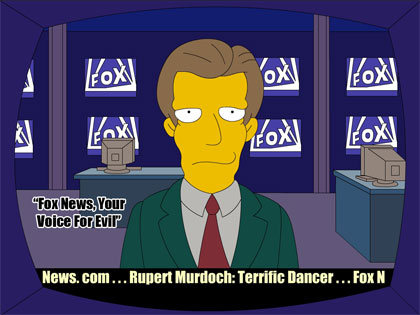Ratings Pet Peeve #45: Pundit Wars and Politics

Today’s pet peeve: how some pop critics and observers try to read cable news ratings as a sign of which political philosophy is in the ascendancy, or even of which outlet is trusted.
This pet peeve plays itself out weekly on a blog I read, TV By the Numbers. They plot pundit ratings against each other, in particular Bill O’Reilly vs. Keith Olbermann, or simply Fox News vs. MSNBC. Inevitably, O’Reilly and Fox News get better numbers, and here’s where the problems start. Some people in the comments see this as a sign that Americans think Fox is the best source for news; and some see it as a sign that America’s a right leaning nation. Many do so with relish, as right-wingers, though some lefties do so with angst and despair too.
This is really, profoundly bad math. Let’s back up a second and look at some numbers. America is supposed to have a population of 307 million. Of those, on Thursday Nov 12th, 2.724 million were watching Fox News in prime time, so say the folks at Nielsen, 962,000 were watching MSNBC, 868,000 were watching CNN, 630,000 were watching HLN, and 348,000 were watching CNBC.
I get it: Fox does way better than the other news channels (about as well as all of them combined, in fact). And I’m not going to try to use numbers to suggest they don’t. But to make the leap from that to saying it’s a right-leaning nation, or that the nation trusts Fox best is to accept, first, that everyone watching likes what they’re watching (Ratings Pet Peeve #1, if you’re counting). Second, it assumes that everyone watching agrees with its politics (or, in some versions of the tale, that everyone watching feels it has no politics, only pure objectivity). But even if we grant both of those specious assumptions, it then assumes – and here’s the clincher – that 0.87% of the population speaks for the entire nation.
There are many reasons why Fox News might be doing better, and its successful harnessing of populist discourse is surely one of them. Maybe, just maybe, it is also because this is a right-leaning nation that trusts Fox News implicitly in all things. But the numbers don’t prove any of that. They’re just stabs in the dark, as though I took Titanic‘s and Finding Nemo‘s box office success as signs that Americans love nautical-themed epics above all others.
Indeed, if we now want to play with other numbers, let’s look at how Greater New York City voted in 2008. Counting New York (Manhattan), Queens, Kings (Brooklyn), and Bronx counties, along with Bergen and Hudson counties in NJ, and Westchester county in NY, yet without counting Richmond county in NY (Staten Island, ‘cause who counts Staten Island? Really??), 2,978,350 people voted for Obama. So more people voted for Obama in a single metropolitan area than watch Fox News in the entire country on an average night.
Remember that when you hear Fox or its supporters trumpet their success as a sign of anything political. Bottom line: Fox is a ratings king in cable news-ish stuff. But lest we are ready to all hail President Meredith Grey and Vice President Peter Griffin, let’s please not assume that ratings trends are clear signs of a nation’s politics.



Excellent post on something that aggravates me, too. Ultimately, it’s a hasty generalization (thank you, brain that’s currently immersed in teaching fallacies to undergrads)–there are countless explanations for the ratings disparity between right- and left-leaning news media.
I’ve heard it argued that lefties watch Fox just to be informed about what the other side is saying/doing (much more than righties watch MSNBC). I’ve also heard arguments suggesting that lefties simply get their news from multiple sources–not just a single cable news outlet.
In any event, as your awesome closing line (hee! Prez Meredith Grey!) so keenly notes–ratings are not sufficient in deducing national political ideology.
Well, that truly is the transformative epistemological power of Fox, isn’t it–that they have almost single-handedly connected OUR conceptions of news to ideology/partisanship. The converse–that what cable news is really about is television (an exciting performance of style) and the numbers game that is associated with the table scraps of cable audiences–isn’t really entertained, though it should be.